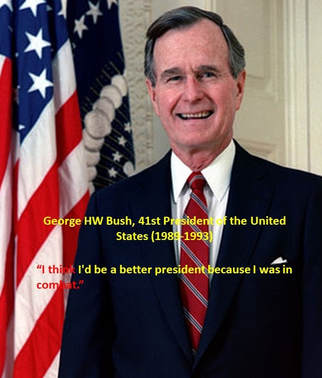
 George Herbert Walker Bush, the 41st President of the United States, was accepted to Yale in 1941, but deferred his college after the attack on Pearl Harbor. He enlisted in the Navy, and became the youngest aviator in service. He was a carrier pilot during the war, and was shot down in 1944 on a bombing mission over the Bonin Islands. He was the only survivor of his crew of three. Bush left service after the war, completed his college degree at Yale, and moved to Texas, becoming a millionaire by the age of 40. He was elected to the House of Representatives, and Nixon named him to be the ambassador to the United Nations. Later, he became ambassador to China and then Director of the CIA. President Reagan selected Bush as his running mate for the 1980 election, and served as vice-president for eight years. He ran successfully to succeed Reagan as President, and easily defeated Democratic candidate Mike Dukakis in the general election. During his Presidency, President Ford signed the North American Free Trade Agreement (NAFTA). He deployed the military to Panama and to the Persian Gulf.
0 Comments
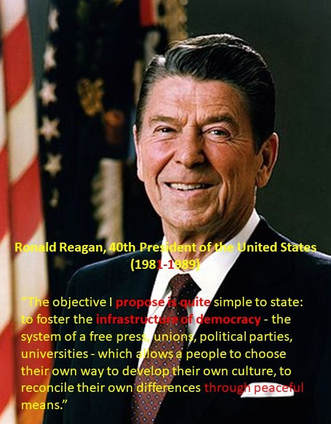 Ronald Reagan was 69 years old in 1980. At the time, Reagan was the oldest person to be elected to the presidency. Reagan had been a Democrat until the early 1960s. He was an actor and had twice been the president of the Screen Actors Guild, the labor union for actors. He became governor of California in 1967, remaining in that post for two terms. Among many notable achievements as President, Reagan signed the Immigration Control and Reform Act of 1986, which granted amnesty to over 3 million illegal immigrants that entered the country prior to 1982, and made it illegal for employers to knowingly hire illegal immigrants. Reagan probably helped push the Soviet Union toward its collapse in 1989, by simultaneously increasing defense spending and calling for increased freedom from Soviet leaders. He survived an assassination attempt in his first term, and eventually acheived historic reductions in the numbers of nuclear weapons held by both the United States and the Soviet Union. 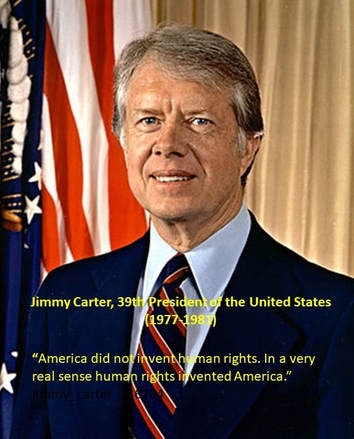 Jimmy Carter is the only graduate of the U.S. Naval Academy to serve as President of the United States. Carter served in the US Navy as a submarine officer, and received training to serve on one of the first nuclear submarines. However, Lieutenant Carter left the Navy prematurely upon the death of his father, and returned to Georgia to take over the family peanut farming business. He subsequently became successful in both business and in politics, rising to become the 76th Governor of Georgia. From this position, he earned the Democratic nomination for President in the 1976 election and won in a close election. Throughout his Presidency and beyond, Carter stuck to his principles even when doing so made him unpopular. Carter granted immunity to those who had evaded the draft during Vietnam. Confronted with an energy crisis, he imposed national conservation measures such as a 55 mph speed limit on interstate highways. Internationally, he achieved a major success in negotiating a treaty between Egypt and Israel at the Camp David Accords, perhaps the most tangible success any administration has achieved in the Middle East. He was challenged, however, by an Iranian revolution that overthrew a US-backed regime and took over 200 hostages from the US embassy. Those hostages were not released until after Carter left office. Also, in 1979, the Soviet Union invaded Afghanistan. In response, Carter ended the détente that had begun under Nixon, imposed a grain embargo on the Soviet Union, and led an international boycott of the 1980 Summer Olympics. Carter lost the 1980 election in a landslide to Ronald Reagan. He has remained active in his post-presidency, and earned the Nobel Prize in 2002 for his role in co-founding the Carter Center, a not-for-profit organization with the goal of advancing human rights. 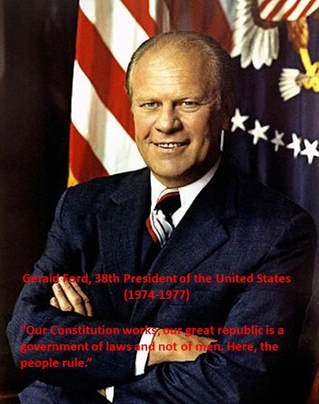 Gerald Ford is the only person to have served as both Vice President and President of the United States without ever being elected to either. He was serving as House Minority Leader on October 10th, 1973, when the elected Vice President, Spiro Agnew, resigned in the face of corruption charges. Ford was named Agnew's successor as Vice President. Ten months later, when President Nixon resigned in the face of almost certain impeachment, Gerald Ford became the 38th President of the United States. He was the first Vice President to assume the Presidency after the passage of the 25th Amendment, which made the established practice of vice presidential succession part of the Constitution. Ford inherited the worst economy since the Great Depression, and was unable to turn that around. He was criticized for pardoning Richard Nixon. He announced that decision to the country with characteristic candor, saying "May our former president, who brought peace to millions, find it for himself." In spite of the economy and controversy over the pardon, President Ford won the Republican nomination for the 1976 election. He lost the general election. 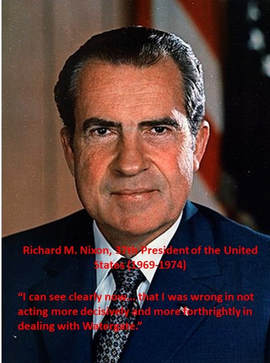 Richard Nixon defeated Hubert Humphrey in the 1968 election. Humphrey got the Democratic nomination after Robert Kennedy was assassinated during the primaries. Nixon's administration negotiated an end to the Vietnam War, brought our prisoners of war home, and ended the military draft. He was the President on July 21, 1969, when Neil Armstrong became the first person to set foot on the moon. He was the first U.S. President to visit the Peoples Republic of China in 1972. He is most remembered, however, for the Watergate scandal--a bungled attempt to wiretap the Democratic Party headquarters. He resigned in August 1974 before what seemed like certain impeachment and removal from office, and was subsequently pardoned by his former Vice President, Gerald Ford. 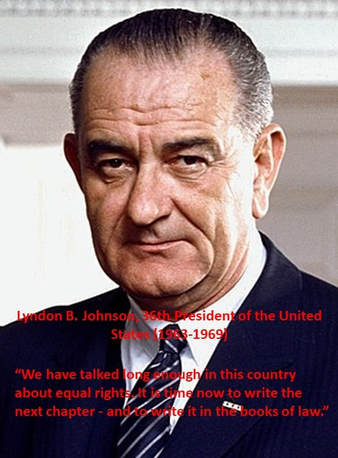 Lyndon B. Johnson became the 36th President of the United States on November 22, 1963, after John F. Kennedy was assassinated in Dallas by Lee Harvey Oswald. Johnson had served in the House of Representatives and in the Senate, rising to become the Senate Majority Leader before being elected as Kennedy's Vice-President. He signed the Civil Rights Act of 1964 into law. Johnson won re-election in 1964 by a landslide over Barry Goldwater. That same year, Congress passed the Gulf of Tonkin Resolution, which gave the President the right to use military force in Vietnam without a declaration of war. Johnson increased the commitment of U.S. military personnel from 16,000 advisors in non-combat roles in 1963 to 525,000 troops, including many in combat roles, by 1965. Growing anger over the war combined with widespread racial tension created an outbreak of violent protests across the country. In 1967, Michigan Governor George Romney (Mitt Romney's father) deployed the National Guard to Detroit in response to riots there, and President Johnson deployed regular Army troops to join them. Johnson expanded Medicare and Medicaid in his War on Poverty. But the violence over Vietnam and civil rights led him to decide not to run for re-election in 1968 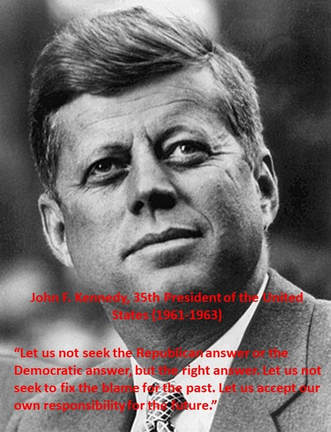 John F Kennedy is the youngest elected President of the United States--he was 43 when elected. Teddy Roosevelt is the youngest person to serve as President--Roosevelt was 42 when he became President after McKinley was assassinated. Kennedy is also the only Roman Catholic ever elected to the Presidency. He was a veteran of WWII, commanding a number of PT boats in the Pacific. His heroic leadership helped save members of his crew after one of these boats--PT-109--was sunk by the Japanese. As President, Kennedy confronted a belligerent Soviet Union with decisiveness, putting the Soviets on notice that any attack on West Berlin would be considered an attack on the United States, even as he added troops and dollars to the U.S. defense budget. After the Bay of Pigs fiasco, Kennedy was challenged again when the Soviets tried to put nuclear weapons and missiles in Cuba. Again, Kennedy met this action by directly confronting the Soviets and instituting a blockade of Cuba. Again, his action allowed a diplomatic resolution to the crises. On the domestic front, Kennedy established the Peace Corps, and started the process that ultimately concluded with the passage of the Civil Rights Act of 1964. Kennedy, however, was not alive to see the Civil Rights Act pass--he became the fourth U.S. president to be assassinated when Lee Harvey Oswald shot him in Dallas on November 22, 1963. During his time as President, John Kennedy had the highest average approval rating of any U.S. President to this day. 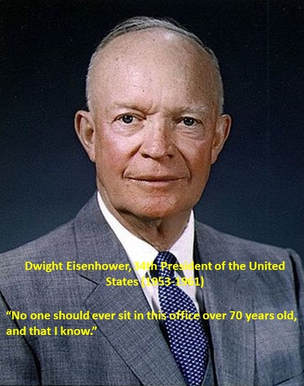 On the strength of his success leading the U.S. military to victory in Europe in World War II, Dwight Eisenhower became the first Republican elected to the Presidency since before the Great Depression. He won both the 1952 and 1956 elections with landslides. His administration was largely consumed with the containment of the Soviet Union and communism. He won congressional support for the Formosa Resolution of 1955, whereby the United States guaranteed to defend Taiwan His support for the French in Indochina led to support for the South Vietnamese government and to the beginning of the Vietnam War. Domestically, Eisenhower was a moderate conservative who expanded social security, covertly opposed Joseph McCarthy, and appointed a Democrat to the Supreme Court. Eisenhower condemned the Soviet invasion of Hungary in 1956, but took no direct action to oppose it. 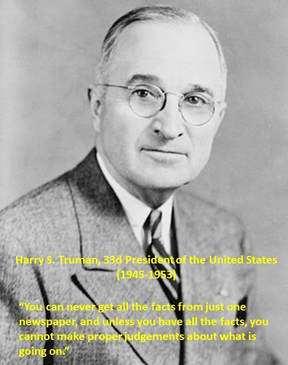 Harry Truman assumed the office of President of the United States when FDR died 11 weeks into his fourth term. WWII in Europe was all but over at that point, but fighting still raged in the Pacific. Truman had previously served as a Senator from Missouri. He was an Army veteran of combat in WWI, and is famous for approving the use of the atomic bombs to end WWII without an invasion of Japan, for invoking the Truman Doctrine to support countries threatened by the Soviet Union, for establishing NATO and implementing the Marshall Plan to protect and rebuild western Europe, and for desegregating the United States military. He was President when North Korea invaded South Korea in June 1950, and during almost all of the Korean War. During that war, Truman fired General MacArthur for attempting to undermine his orders denying authority to attack Chinese supply bases inside China. 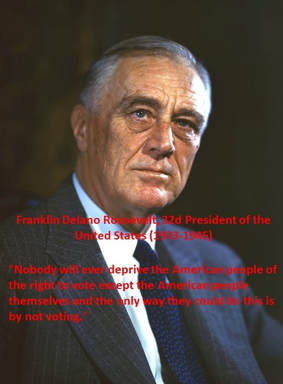 Elected at the height of the Great Depression, Franklin Roosevelt is the only President to win four elections for the presidency. He is the only President to serve more than two terms. He died 11 weeks into his fourth term. Not only did Roosevelt implement sweeping changes to our government to address the Great Depression, but he also led the United States during most of the Second World War. Perhaps because of the severity of the challenges faced by the country under his leadership, and the persistence of the institutions he implemented under the so-called New Deal, Franklin Roosevelt is usually ranked in the very top tier of American presidents. Franklin Roosevelt was the fifth cousin of Theodore Roosevelt (26th President). |
AuthorAuthor of Thy King Dumb Come and Accountability Citizenship, Stephen P. Tryon is a businessman and technologist with extensive experience in e-commerce, a retired Soldier, and former Senate Fellow. Archives
January 2024
Categories |

 RSS Feed
RSS Feed
